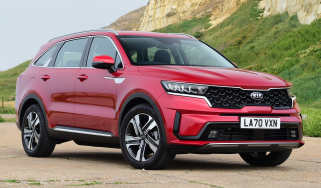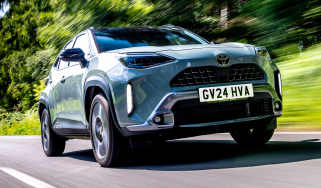Toyota Yaris Cross - Engines, performance and drive
It’s a case of hybrid efficiency over driving fun with the Toyota Yaris Cross

With a focus on efficiency rather than outright performance, the Toyota Yaris Cross doesn’t offer too much in the way of sprinting ability. Acceleration times are average at best, and the combination of a 1.5-litre three-cylinder petrol engine, a small electric motor, and a CVT automatic transmission won’t excite keen drivers in the same way a manual Ford Puma would. If you push on a bit, the petrol engine in the Yaris Cross provides a typical three-cylinder thrum, which some might think sounds a little more interesting than a droning four-cylinder.
| Model | Power | 0-62mph | Top speed |
| Yaris Cross 1.5 Hybrid | 114bhp | 11.2 seconds | 106mph |
| Yaris Cross 1.5 Hybrid AWD | 114bhp | 11.8 seconds | 106mph |
| Yaris Cross 1.5 Hybrid 130 | 128bhp | 10.7 seconds | 106mph |
| Yaris Cross 1.5 Hybrid 130 AWD | 128bhp | 11.3 seconds | 106mph |
What is the Toyota Yaris Cross like to drive?
In town
Toyota has identified that Yaris Cross buyers will most probably live in more built-up, urban areas, so it’s important that the small SUV is comfortable and easy to pilot around town. Has it succeeded? For the most part, yes. The Yaris Cross can run on smooth electric power up to 30mph – provided you’re very gentle with the accelerator. When the petrol engine has to kick in, the switchover is barely noticeable as it kicks in to assist in increasing the pace. It’s a good set-up for driving in stop-start traffic for those after an automatic, feeling much less jerky than an auto Citroen C3 Aircross, Peugeot 2008, and Vauxhall Mokka. During our long-term testing of a Yaris Cross, we found the hybrid system did a great job of utilising battery power as much as possible in stop/start traffic.
On A- and B-roads
Around bends, the Yaris Cross is a surprisingly composed and fun little car to chuck around, though ultimately, it isn’t as nimble as the aforementioned Puma. Similarly, while ride comfort is reasonably good at slower speeds, the car is a little bit fidgety on faster roads, and it certainly can’t match the plush ride of the Hyundai Kona.
More reviews
Car group tests
In-depth reviews
Road tests
The GR Sport trim promises sharper steering than other versions and features tweaked suspension to make the Yaris Cross a bit more fun. However, we found the stiffer set-up gives it a fidgety ride at low speeds like a Nissan Juke, and feels a little more harsh over rougher surfaces at speed. The GR Sport does keep body lean in check better than the standard version, but the trade-off isn’t good enough to warrant the further reduction in ride quality.
On the motorway
Toyota has made several changes to improve refinement in the Yaris Cross, including thicker glass for the windscreen and all the side windows. These have helped reduce wind noise, but road and tyre noise are still noticeable at higher speeds.
0-62mph acceleration and top speed
Most versions of the Toyota Yaris Cross use a ‘self-charging’ hybrid system producing 114bhp and 141Nm of torque, giving it a 0-62mph time of 11.2 seconds for the front-wheel drive version, while the extra weight of the all-wheel drive version increases this acceleration time to 11.8 seconds.
Top-spec GR Sport and Premiere Edition cars boast a more powerful setup with 129bhp and 185Nm, which trims the 0-62mph time down to 10.7 seconds, or 11.3 seconds if you want all-wheel drive. The extra power comes from an uprated e-motor, which makes a noticeable difference around town, feeling quicker away from the lights. We also noticed the petrol engine didn’t seem to chime in as often, helping improve fuel economy. When the engine does kick in, it sounds a little strained when you put your foot down to join the motorway or overtake, though once you ease off, everything settles down.










